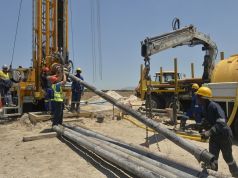Will the grand GERD dam trigger a war between Egypt and Ethiopia?
The war of words has recently escalated between Egypt and Ethiopia over the project for the grand Ethiopian dam GERD and it threatens to turn the Nile, one of the world natural and civilizational wonders, from the cradle of civilization and peace into a source of conflicts and wars.
Article pubblished by IFIMES
It is for a good reason that the Greek historian Herodotus in about 400 B.C. called Egypt “the gift of the Nile”, for without it the desert would not have turned into a modern agricultural civilization for that time.
Following nine years of intensive negotiations between Cairo and Addis Ababa, Ethiopia is now striving to complete the project and put the dam into service in July 2020. After the failure of Egypt-Sudan-Ethiopia tripartite negotiations to resolve the crisis between the Nile basin countries, Ethiopia rejected the agreement achieved under the auspices of the USA.
After several years of unsuccessful tripartite negotiations the countries in dispute sought assistance from external mediators – the United States of America and the World Bank (WB). Difficult negotiations led by the US Secretary of the Treasury Steven Mnuchin resulted in the draft agreement in end February 2020, which the USA believe to address all issues in a fair and balanced manner taking into account the interests of the three countries.
However, the negotiations concerning the filling and operation of the dam held in Washington on 12 and 13 February 2020 soon came to a deadlock as Ethiopia turned down the signing of the agreement claiming that the US President Donald Trump was given inaccurate and inadequate information about the dam. Egypt's response was: “If the water means electricity for Ethiopia, it is a life-or-death matter for Egypt”.
In the joint statement of 29 February 2020 Ethiopian ministry of foreign affairs and ministry of energy and water confirmed that Addis Ababa would start filling the reservoir lake along with other construction works based on its right to equitable use of the Nile's water resources. According to their statement the initial filling would take place already during this year's rainy season, which is in the beginning of July 2020.
Cairo is afraid of the potentially negative effect of the dam on the Nile's annual flow which is now 55,5 billion cubic metres, while Sudan has 18.5 billion cubic metres based on 1929 and 1959 agreements.
Egypt fears that without signing the final agreement, the filling and operation of the dam would reduce its supply from the Nile which provides 90% of water for households and irrigation.
The Grand Ethiopian Renaissance Dam or the Millennium Dam is located on the Blue Nile about 20-40 km from the Ethiopia-Sudan border. It is one of Ethiopia's three dams built for the purposes of electricity production. Once finished, it will become the largest hydroelectric power plant in Africa and the tenth largest dam for electricity production in the world. The costs of completion of the project are estimated at USD 4.7 billion.
The benefits for Ethiopia
The main benefit gained from the dam will be production of electricity. All energy generated by GERD will be fed into the national power supply network, thus supporting the development of the whole country, both rural and urban. Its role will be to stabilise the national energy network. Export will only be possible if the country marks total energy surplus, which is expected mostly during rainy seasons. Total installed capacity of all turbine generators will be 6,450 MW. The dam will play an important role in supplying the Ethiopian and Sudanese capitals Addis Ababa and Khartoum which are both located about 400 km from the dam.
The exact influence of the dam on downstream countries is not known yet. Egypt is afraid of a temporarily reduced inflow during the filling of the reservoir lake and also of the permanently reduced water flow due to the evaporation from the dam. The volume of the lake is about the same as the Nile's annual flow at the Sudan-Egypt border (65.5 billion cubic metres). The reduction in water flow will last a few years, until the lake is filled up.
The dam also has a strong political connotation in Ethiopia. No other issue has ever united all ethnical groups and religious hierarchies (the Muslim, Catholic, Anglican, Orthodox etc.) like the Grand Dam. Bearing in mind that Ethiopia is in the election year (election is to be held in August 2020) it is hard to expect that Ethiopian Prime Minister Abiy Ahmed Ali (although the 2019 Nobel Peace Prize winner) would soften his position or yield to Egypt.
Ethiopia is very rich in unexploited energy sources, but it only supplies electricity to 30% of its 109 million inhabitants. Now the country's ambitious plan till 2025 is to provide electricity through public network for 65% of its population while the other 35% would be covered by other sources such as independent solar systems.
GERD's influence on Egypt
Egypt is worried that during the filling of the dam it would lose about 11 to 19 billion cubic metres of water, which would cause two million farmers to lose their income.
It would affect 25% to 40% of Egypt's electricity supply. Hydroelectric power plants account for less than 12% of total annual electricity production in Egypt. The dam could also cause permanent decrease in the water level of Lake Nasser, if floods were accumulated in Ethiopia instead of in that lake.
If floods accumulate in the new GERD instead of Lake Nasser, the current evaporation would be reduced by more than 10 billion cubic metres per year, and also the capacity of the Aswan Dam hydroelectric power plant would be reduced by about 100 megawatts due to three metres lower water level.
For years, the Nile has been Egypt's important strategic issue. It has led the country into severe tensions in relations with other countries in the Nile basin, especially during 1990s when those relations were oscillating sharply. All this is the consequence of Egypt's mismanagement of the Nile as one of the main pillars of the country's economic and national security. The careless practice in the past regarding the Nile had repercussions on foreign political field and the field of investments. Egypt has strived to find agreement with other countries in the Nile basin regarding the projects on the Nile that may affect the share of water for Egypt. It has also strived to ensure sufficient water quantities for the operation of Aswan Dam, for electricity supply and agriculture. The Nile represents one of the main resources for the development of Egypt. Stable supply ensures the country's stability and security. In view of its strategic importance for existence of the country and its nation, we may expect that the next wars in the region will be fought over water.
Agriculture represents 14.7% of GDB in Egypt and employs about 8.5 million people, which accounts for 32% of the country's labour market.
Will the dam dispute trigger a war between Egypt and Ethiopia?
The possibility of going to war over the Nile water is deeply entrenched in the Egyptian national subconscious because the Nile has always been the source of life in an overwhelmingly (93%) desert state. This harsh nature made 100 million Egyptians, throughout their long history, grasp that in order to maintain the water flow, blood shall sometimes be spilled. No Egyptian government can afford to stand aside and see its people face thirst.
In 1978, Egypt's president at that time and Nobel Prize winner, Anwar Sadat,who signed the peace treaty with Israel after a long war, stressed that "The only matter that could take Egypt to war again is water".
Ten years later, in 1988, the Egyptian Former UN Secretary General Boutros Boutros-Ghali warned that "The next war in our region will be over the waters of the Nile, not politics".
Late Egyptian president Mohamed Morsi held a meeting in June 2013 where they discussed the Egypt's position on the Ethiopian dam and even touched upon the possibility of using military force. Although the meeting was held in secrecy, its recording was later released – accidentally or deliberately.
After the negotiations with Ethiopia collapsed in end February 2020, Egyptian President Abdel Fattah El-Sisi chaired an expanded meeting of the commanders of the armed forces in the beginning of March 2020, in the presence of the Minister of Defence and Military Production and the Commander-in-Chief of the Armed Forces. Neither Ethiopia nor the Nile were mentioned in the official statements issued after the meeting, although President El-Sisi stressed that the Egyptian armed forces should continue to show the highest levels of caution and combat readiness, to execute any tasks entrusted to them to protect Egypt's national security, in the light of current challenges in the region.
El-Sisi's meeting with the Egyptian military officials took place only a few hours after Ethiopian Foreign Minister Guido Andragashio announced that his country would start filling the dam in July 2020.
After five years of negotiations between his country, Egypt and Sudan, the Ethiopian minister provokingly stated: "The land is our land, the water is our water, and the money by which the Renaissance Dam is built is our money, and there is no force that can prevent us from building it."
President El-Sisi’s meeting with his military leaders at this time opened the question whether Egypt puts the military move among the alternative options for resolving the dispute over the Nile waters after the failure of negotiations. Note should be taken of the ranking of the Egyptian and Ethiopian armies on the list of the most powerful armies in the world. The first ranks 12th in the world for the year 2019, while the second ranks 47th out of 137 countries.
Despite Egyptian supremacy with Rafale and F16 fighters over Ethiopian Su-25 and Su-27 fighters of Russian origin, is not expected that Egyptians would embark upon the adventure at a distance of about 2,500 km. The Ethiopian army is equipped with the Israeli short-to-medium Spyder-type air defence systems to protect the GERD dam.
The analysts of the IFIMES International Institute believe that the solution to this long-year dispute should be sought in continued negotiations under the auspices of the USA and World Bank with an active role of the US President Donald Trump who really wants to settle the dispute between the two allies in his lust for winning the Nobel Peace Prize before the November election.
It is high time to prevent the Nile from turning red and bloody, if we want to keep it blue and white like its tributaries.
Source: IFIMES - IFIMES – International Institute for Middle East and Balkan Studies, based in Ljubljana, Slovenia, has Special Consultative status at ECOSOC/UN, New York, since 2018.
General Info
View on Map
Will the grand GERD dam trigger a war between Egypt and Ethiopia?
Unnamed Road Hosanna, Ethiopia






























